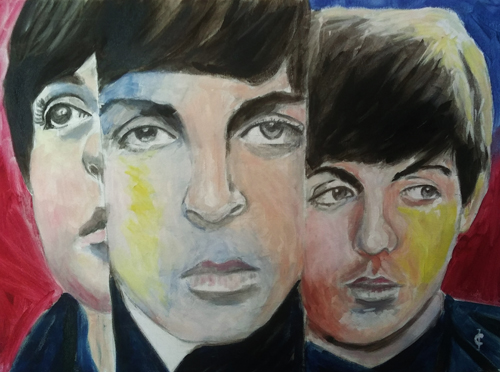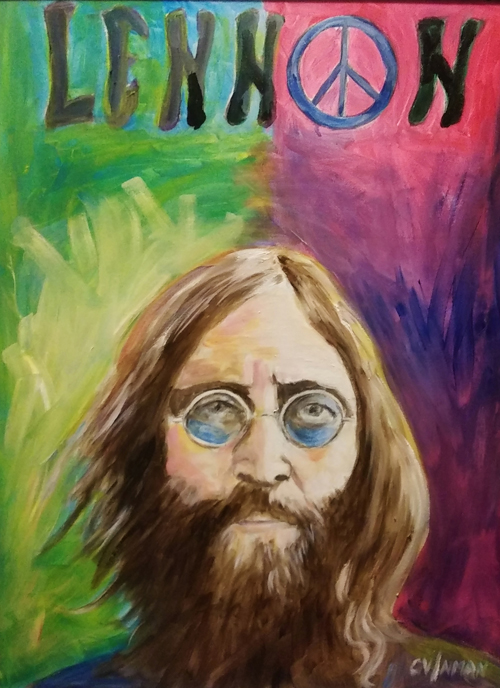
Your complimentary articles
You’ve read one of your four complimentary articles for this month.
You can read four articles free per month. To have complete access to the thousands of philosophy articles on this site, please
Music
The Beatles: Nothing is Real
Clinton Van Inman gets back to the psychedelic Sixties.
“It was more than sixty years ago today when Sgt Pepper taught the band to play.” Well, that’s not quite right. Sgt Pepper wasn’t the band’s first album, and it even came a few years after the Beatles’ breakthrough U.S. appearance on the Ed Sullivan Show in 1964. Still, Sgt Pepper’s Lonely Hearts Band marked a turn for John Lennon and Paul McCartney towards a more philosophical style of songwriting. The world has never been the same since. Their songs still reverberate throughout the ages like no others, with lyrics laced with profound thoughts on themes of peace, freedom, authenticity, alienation, protest, and love. Most people have never read or even heard of Kant or Hegel, but most know some Beatles slogans, like ‘Let it Be’ or ‘All you need is Love’. Though not deemed philosophers in the traditional sense, their ideas contribute much to popular thought especially popular existentialism. Their songs are an attempt to crawl out of our modern dead end of absurdity, meaningless, and doubt, to perhaps find something more than ‘misunderstanding all you see’ (Strawberry Fields Forever).
Almost every Beatles song can be interpreted philosophically, but my favourite album (along with millions of other fans) has always been Magical Mystery Tour (1967). This album has been banned, criticized, ridiculed, and censored so much it’s amazing that it has survived.

Paul McCartney by Clint Van Inman
Like its name, it remains a most baffling album. It’s about a tour bus travelling about England, and it provides a delightful odyssey – but not like Homer, more like Monty Python! Deep down it is a search for meaning – but nothing really happens except the hope of finding a new place. The journey has no end, no purpose, only the hope of finding something magical. And we are all on a tour in a similar sense: a journey to we know not where. We are not sure where the bus is going or when it will stop. I can imagine someone sitting in the back of the bus saying “Just sit back and enjoy the ride!” The best we can hope for is that we can find love on the way.
The movie of the same name was a disaster, but the album has perhaps the best songs of the Beatles. John Lennon said that Strawberry Fields Forever was the finest song he ever wrote. In particular, the lyrics, “Let me take you down, cause I’m going through Strawberry Fields, Nothing is real, and nothing to be hung about” have puzzled fans for generations.
Interpreted philosophically, I think they offer insights into reality. Philosophers since Thales (sixth century BCE) have been on a quest to find the underlying nature of reality, or to put it another way, what the world is made of. Thales himself thought that the ultimate nature of the physical world was water; Anaximander then said it was air. Democritus deemed reality to be made of atoms; Parmenides meanwhile said it was Being itself. Plato believed the really real to be his Forms or Ideas. Much later, Gottfried Leibniz (1646-1716) said the world was made of monads – individual entities that mirror the rest of the world; then Arthur Schopenhauer (1788-1860) said that ultimate reality was Will. Now everything is believed to ultimately be forces, fields, and energy. The quest continues… until one realizes that ‘nothing is real’ – the physical world is all a big construct. No use knocking your head against a wall ‘misunderstanding all that you see’, as there is ‘nothing to get hung about’. From the dreamlike perspective of Strawberry Fields Forever there are no absolute truths, only possibilities – where anything is possible.

John Lennon by Clint Van Inman
Pop Goes Philosophy
John Lennon was no egghead, only ‘the eggman’ (I Am The Walrus). But it still amazes me how the Beatles could turn complex philosophical ideas into simple, enchanting lyrics. In this way, the Beatles helped create a new venue for thought. Coupled with their dreamlike music, the Beatles have expanded the philosophical audience into popular culture. But for them philosophy was not reserved for the classroom and the chalkboard, but was rooted in experience: ‘Life is not a puzzle to be solved, but a life to be lived,’ I think is the fundamental message. Not words to support some theory, but words of wisdom to live by. Indeed, the Beatles offered words of hope and joy to live by.
With the Beatles, popular philosophy evolved to new heights. In the previous generation, the existentialists Sartre, de Beauvoir and Camus had changed the philosophical landscape by writing novels. But now the Beatles, along with the likes of Bob Dylan, Jim Morrison, and many others, turned rock’n’roll into a philosophical adventure – some of which is even taught now in Philosophy 101. ‘Nothing you can think cannot be thunk’.
The final track on the Magical Mystery Tour album is a song that epitomizes the Beatles’ philosophy: ‘All You Need is Love’. This is a simple song with a simple message, but it’s the hardest of words to live by. But even if “it’s been a hard day’s night, and you’ve been working like a dog”, still, “We can work it out”!
At the end of ‘All You Need is Love’ we hear the optimistic words, “There’s nothing you can do that can’t be done. All you need is love, love, love is all you need…” The song then fades away, into a dreamlike state. John said that, “A dream you dream alone is only a dream. A dream you dream together is reality. And finally ‘in the end the love you take is equal to the love we make’.” (The End, from Abbey Road, 1969).
© Clinton Van Inman 2025
Clinton Van Inman was born in England, raised in North Carolina, graduated SDSU with a degree in philosophy, and is now retired and living in Florida with his wife Elba.









